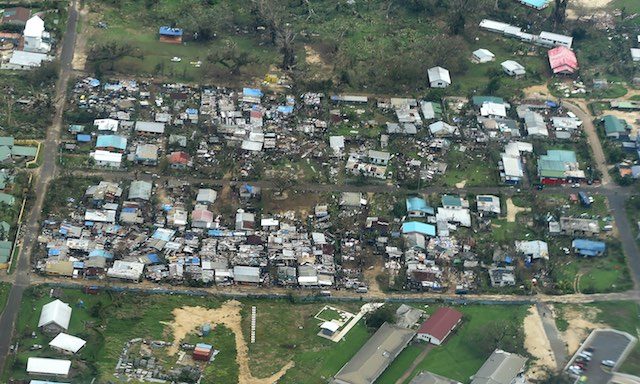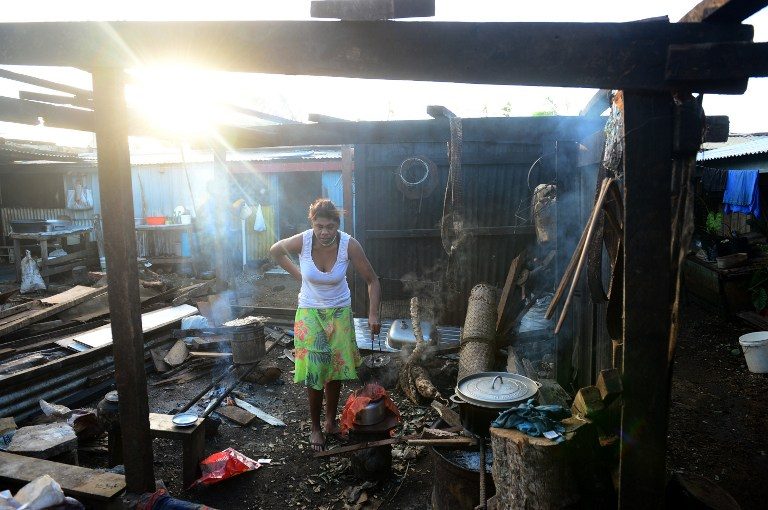SUMMARY
This is AI generated summarization, which may have errors. For context, always refer to the full article.

PORT VILA, Vanuatu – When Samson Toara squeezed under his bed with two other young men as Cyclone Pam pummeled the Vanuatu capital Port Vila, ripping off the roof and flooding his home, his thoughts turned to death.
“The cyclone sounded like a big plane flying very low, like thousands of people running on the roof,” the 25-year-old told Agence France-Presse at his damaged home on Tuesday, March 17.
“We were waiting to see whether we would survive or not.”
Toara stayed in his flimsy house, made of timber and corrugated metal, while his wife and 3 young children sheltered at a nearby evacuation center.
But as the maximum Category 5 storm hit, it lifted the wooden beams of the house, tore off part of the roof and sent tonnes of water pouring in.
“We couldn’t get outside as the door was blocked,” Toara said as the ferocious winds ripped trees from their roots and sent metal roof sheetings flying.
“The rain and wind was like white smoke and it flooded up to my knee. But I told the boys don’t worry about the water. As long as we survive.”
Outside Toara’s home, huge piles of broken branches and leaves lined roads as residents worked together in a massive clean-up across Port Vila, hacking at fallen trees with machetes and dragging branches away.
Others sunned their personal belongings, household items, and clothes on the ground near the shanty accommodation typical of the homes many occupy. Nearby, children laid out mattresses on the flat concrete roof of a convenience store.
Vanuatu is no stranger to cyclones, which are common in the South Pacific at this time of year.
But locals said Pam, which slammed past the country’s more than 80 islands late Friday, killing at least 24, felt worse than Cyclone Uma in 1987 when 30 people died after two ferries sank off Port Vila.
With communications down to many of the other islands, aid agencies said the full scale of the latest disaster was not yet known.
Everyone’s worried

“Everybody’s worried about their homes and kids,” Nelly Vano Song, 43, told Agence France-Presse as she stood in front of her house, brilliant sunshine streaming through the hole left by a missing roof.
A few streets away, her 20-year-old daughter Mayline shared a small guest room at a Port Vila resort turned into a makeshift evacuation center with 9 other family members, including 3 young children and a baby.
Mayline Vano Song nursed the wailing baby as 22-year-old relative Melissa Song looked on.
Behind her, the crystal blue waters of the harbor glistened under the morning sun, a reminder of Vanuatu’s fame on the tourist trail as an idyllic island getaway.
“We’ve had no sleep since Thursday (March 12),” Melissa Song told Agence France-Presse. “We’ve just been eating tinned tuna, fish and pork.”
While Port Vila residents have lived off tinned food over the past few days, humanitarian organizations assessing the damage warned that survivors in the outer islands, who are often subsistence farmers, could be quickly running out.
Ruby Esau, 60, who has lived through numerous cyclones, said Pam felt stronger and lasted much longer than those she had experienced in the past.
“Before, it’ll take one to 3 months to recover,” Esau said. “It’ll be longer now.”
Nelly Vano Song, who has been unable to contact relatives living on the outer islands, said she was unsure if her family would see any of the aid being flown in by humanitarian agencies and the Australian, New Zealand and French militaries.
“The cyclone has affected all of us,” she said. “We just have to work hard to get back to normal.” – Glenda Kwek, AFP / Rappler.com
Add a comment
How does this make you feel?
There are no comments yet. Add your comment to start the conversation.